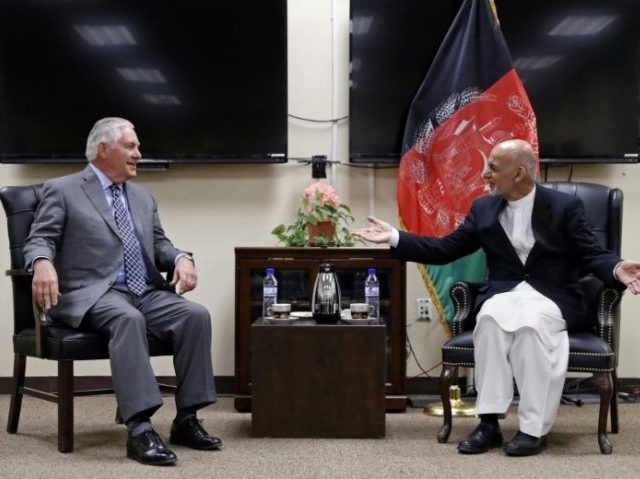Secretary of State Rex Tillerson arrived outside Kabul, Afghanistan, Monday for an unannounced visit.
Tillerson met with Afghan President Ashraf Ghani amidst the Trump administration’s roll-out of a new “conditions-based strategy” ratcheting up American military pressure in the country.
Tillerson and Ghani met at Bagram Air Base, north of the Afghan capital, where they “reaffirmed the U.S.-Afghan commitment to achieving peace, stability, and long-term prosperity in Afghanistan,” according to a statement from the U.S. Embassy in Kabul.
“It’s not an unlimited commitment; [President Donald Trump] also made it clear it’s not a blank check commitment. That’s why it is a conditions-based commitment,” Tillerson told reporters at Bagram.
More than 3,000 additional American troops were dispatched to Afghanistan this month to support what Secretary of Defense Jim Mattis told Congress was the first time in the 16-year war there that the entirety of the Afghan military was on the offensive against the Taliban and other anti-government elements.
Tillerson was upbeat about progress in the Afghanistan, saying that, in the last few years, “Afghanistan has come quite a distance already in terms of creating a much more vibrant population, a much more vibrant government, educational systems, a larger economy.”
The secretary of state went on to say that peace would be possible through military pressure on the Taliban and appeals to “moderate” elements of the Islamist movement that ruled Afghanistan before the 2001 U.S. invasion. “Clearly, we have to continue the fight against the Taliban and against others in order for them to understand they will never win a military victory,” he said. “And there are, we believe, moderate voices among the Taliban, voices that do not want to continue to fight forever.”
Some experts are less optimistic about the new strategy’s prospects. Last week, a report by the Erik Prince-affiliated Carl Hanson Group claimed that, despite an intensification of American bombing, “we have yet to see any real gains for the new strategy.”
Tillerson also addressed the tough line the Trump administration has taken with Pakistan over its relationship with Taliban. “I’ll be traveling to Islamabad tomorrow, in fact, to meet with Pakistani leadership as well,” he told reporters at Bagram. “[W]e have made some very specific requests of Pakistan in order for them to take action to undermine the support that the Taliban receives and the other terrorist organizations receive in Pakistan.”
Tillerson explained that the new strategy would also involve a “conditions-based approach” with Pakistan. “It will be based upon whether they take action that we feel is necessary to move the process forward of both creating the opportunity for reconciliation and peace in Afghanistan, but also ensuring a stable future Pakistan,” he said.
Both President Trump’s August address and Tillerson’s remarks last week indicate a U.S. diplomatic shift from Pakistan, America’s traditional ally in the South Asia region, to India. Tillerson will head to Islamabad, Pakistan, with Ghani this week for further negotiations and reporters asked if they would address his India speech.”I’ve not spoken to anyone in the Pakistani leadership since the speech I gave on India. That’s certainly something we’ll be talking about during the visit tomorrow,” he said, adding, “We do, though, believe that India has a very important positive role that India can play in the process to achieve a peaceful, stable Afghanistan as well.”

COMMENTS
Please let us know if you're having issues with commenting.